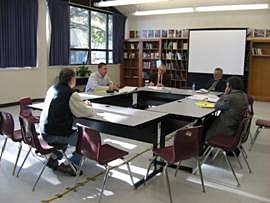The Scholarship of Teaching and Learning @ CSM
By Jean Mach
 On November 28 and 29, we were honored at CSM to have visitors from the Wabash Center of Inquiry in the Liberal Arts, a highly regarded model for SoTL Centers across the country. Charles Blaich, Director of the Wabash Center, and Steve Weisler, Teagle Assessment Scholar, came to share their experiences in The Wabash National Study, a large-scale study that involves educational leaders from around the country in creating and discussing assessment projects in order to “build ‘communities of practice’ around assessment.” On November 28 and 29, we were honored at CSM to have visitors from the Wabash Center of Inquiry in the Liberal Arts, a highly regarded model for SoTL Centers across the country. Charles Blaich, Director of the Wabash Center, and Steve Weisler, Teagle Assessment Scholar, came to share their experiences in The Wabash National Study, a large-scale study that involves educational leaders from around the country in creating and discussing assessment projects in order to “build ‘communities of practice’ around assessment.”
The following passage, taken from the Center of Inquiry’s website, gives an indication of the purpose and focus of
their work:
“The goal of liberal arts education is to create an attitude of intellectual openness, especially to inquiry, discovery, new ideas, and varied perspectives. Liberal arts education should cultivate both the eagerness to grapple with difficult questions and the willingness to develop and enact provisional answers to these questions. Liberal arts education should lead us to carefully examine our own and others’ beliefs, actions, and values.
The Center of Inquiry collaborates with researchers, faculty, administrators, and the public to gather high quality evidence on the outcomes of liberal arts education. Although we believe liberal arts education impacts a wide range of important qualities, our research currently focuses on:
* Integration of Learning
* Lifelong Learning
* Effective Reasoning and Problem Solving
* Moral Character
* Intercultural Effectiveness
* Leadership
* Well-being”
(quotations from the Wabash Center’s website: www.liberalarts.wabash.edu).
Charlie’s presentation, entitled “Do we really accomplish what we hope for our students? Conditions and practices that impact student learning," made it clear that all types of educational institutions, public and private, large and small, two-year and four-year, share similar challenges in educating their students and have much to learn from one another. The study results that Charlie discussed with us were often fascinating, surprising, and/or complex, yet one simple point stood out: The “how” of an institution’s interactions with its students is even more important than the “what.”
Over the two days of the visit, Charlie and Steve talked with faculty, administrators, and students, gave us ideas for developing our own assessment practices, and briefly summarized, before they left, what they were learning from these conversations. As they had indicated earlier, often they are only helping an institution focus what it already knows. To paraphrase Charlie’s impressions, we are making good progress in many ways, but our students speak of a wide range in the quality of their experiences here. Such friendly and honest feedback will, I hope, lead to many more conversations with them and with each other here at CSM, helping us to develop that “eagerness to grapple with difficult questions” as well as that “willingness to develop and enact provisional answers.”
This site visit was a generous gift from the Wabash Center of Inquiry and a benefit of CSM’s participation in the CASTL Institutional Leadership Program. The materials from the presentation are available in the SoTL Center. |